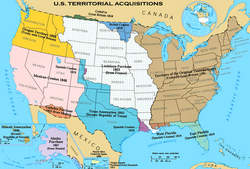Settler state
It has been suggested that this article be merged into Settler colonialism. (Discuss) Proposed since February 2025. |

A settler state is an autonomous or independent political entity established through settler colonialism by and for settlers. This occurs when a migrant settler society assumes a politically dominant position over the indigenous peoples and forms a self-sustaining state that operates independently of the metropole, the homeland of a colonial empire. Such states are founded upon settler domination over the natives. In many cases, indigenous populations were largely displaced, eliminated, and subject to colonial genocide and ethnic cleansing. Unlike conventional colonies, which primarily exploited natural resources for the benefit of the metropole, settlers saw settled land as their homeland, and sought to strengthen settler institutions. Countries that have been described as settler states include the United States, Canada, Australia, New Zealand, Israel, and Taiwan, and formerly South Africa, Liberia, and Rhodesia.[1][2][3]
Characteristics
[edit]In settler states, settler colonists and their descendants typically form the demographic and political majority, displacing the once-dominant indigenous populations. For instance, in Canada, white settlers and their descendants now make up the majority, while indigenous peoples constitute only 5% of the population. Furthermore, foreign languages, customs, and policies are forcibly imposed on the indigenous people, as seen with the enforcement of the English language and Western values in the Anglosphere.[4]
Settler states such as the United States and Australia have maintained strong cultural connections to their colonial roots in the British Empire, even after gaining independence. These countries have retained the same colonial-era practices of domination and exploitation, while largely excluding the values of indigenous peoples.[5]
Prior to the transition to settler states upon independence, these territories begin as settler colonies, subordinate to the metropole of the ruling colonial empire.[6]
References
[edit]- ^ Weitzer, Ronald (2023-11-15). Transforming Settler States: Communal Conflict and Internal Security in Northern Ireland and Zimbabwe. Univ of California Press. pp. 24–30. ISBN 978-0-520-33328-4.
- ^ Liu, Sung-ta (2013-04-01). "Settler urban legacies: A case study of Taipei City". Cities. 31: 239–247. doi:10.1016/j.cities.2012.06.018. ISSN 0264-2751.
- ^ Bratton, Michael (1979). "Settler State, Guerrilla War and Rural Underdevelopment in Rhodesia". Issue: A Journal of Opinion. 9 (1/2): 56–62. doi:10.2307/1166943. ISSN 0047-1607.
- ^ Gharabaghi, Kiaras; Charles, Grant (2020-10-26). Child and Youth Care across Sectors, Volume 2: Canadian Perspectives. Canadian Scholars’ Press. p. 8. ISBN 978-1-77338-195-4.
- ^ Libby, Ronald T. (2003-10-29). Hawke's Law: The Politics of Mining and Aboriginal Land Rights in Australia. Penn State Press. ISBN 978-0-271-04467-5.
- ^ Cavanagh, Edward; Veracini, Lorenzo (2016-08-12). The Routledge Handbook of the History of Settler Colonialism. Taylor & Francis. p. 157. ISBN 978-1-134-82847-0.
